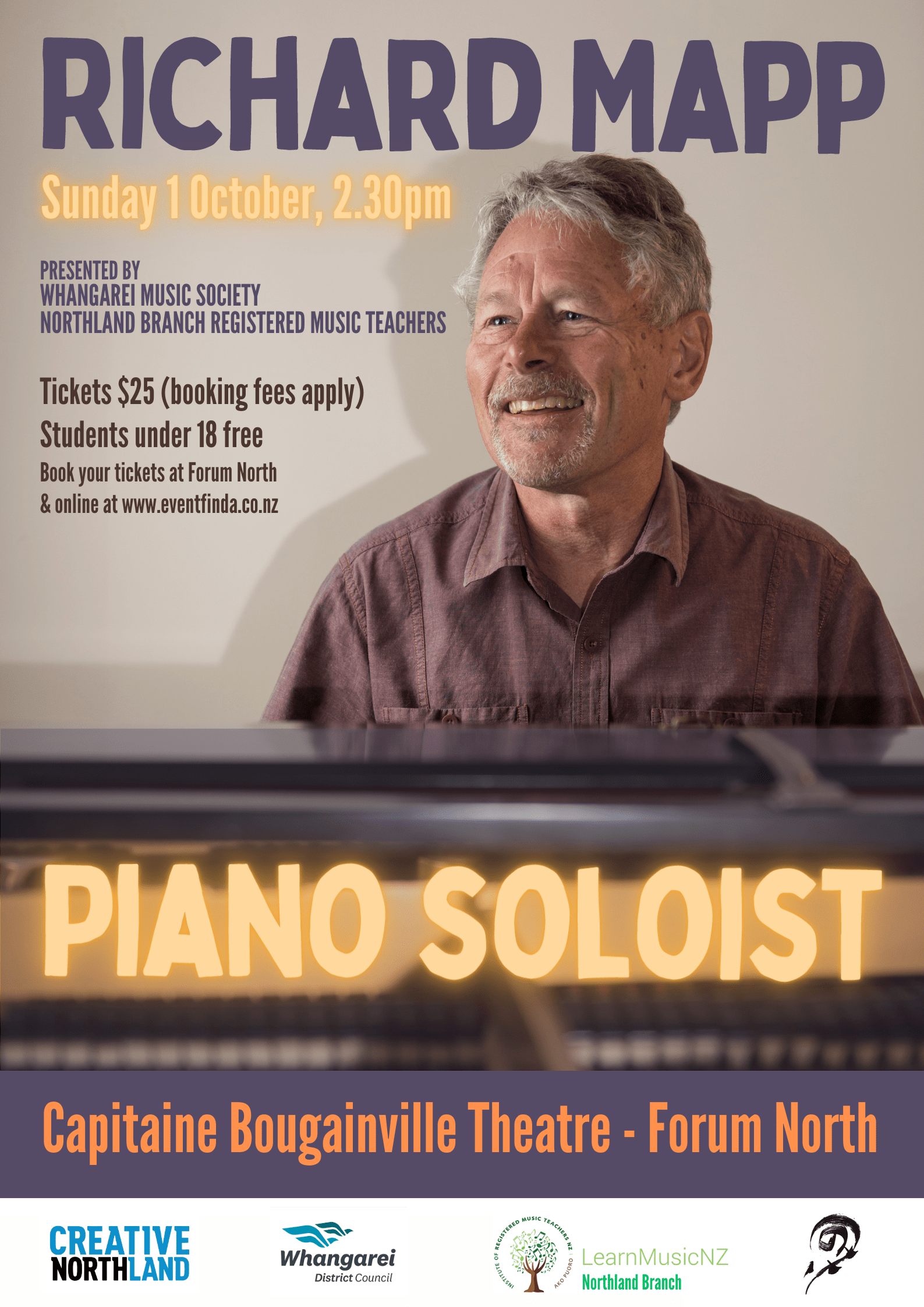Piano maestro of international acclaim plays the classical masters
Venue/times
Saturday, 1st October, 2.30pm.
Capitaine Bougainville Theatre,
Forum North, Whangarei
Overview/ A wonderful opportunity
Richard Mapp, internationally recognised pianist, will be performing a solo concert on Saturday, 2.30pm, 1st of October, in Whangarei’s Capitaine Bougainville Theatre, Forum North.
This concert, presented by The Whangarei Music Teachers Association and Whangarei Music Society, celebrates the replacement of the community owned Steinway piano which was damaged while in storage. When Richard heard of this, he agreed to play to celebrate this auspicious occasion.
This is especially because of his love of the Steinway as an instrument as shown by his statement:
“Playing my Steinway is consistently a stimulating and rewarding experience. A fine Steinway will not only obey the commands of the pianist’s brain and fingers, but will also inspire the pianist to draw out the widest possible range and tone and colour.” May 18th, 1998.
Richard Mapp – Musician Biography.
Richard Mapp’s illustrious career began as a child protege, making his solo debut at the age of 12 with the Christchurch Civic Orchestra playing Mendelssohn’s Concerto No 1. He studied with Ernest Empson, a Godowsky pupil, and later at the University of Otago with the Maurice Till.
Richard then pursued postgraduate studies with Gordon Green at the Royal Academy of Music in London, where he later held a teaching fellowship. He also received coaching from William Pleeth (cellist and teacher of Jacqueline du Pre) and the Beaux Arts Trio.
After a successful debut at the Wigmore Hall, Richard gave solo, duo and recital engagements in Europe, Scandinavian and North America. He recorded for the BBC and for radio in Canada, Germany, Sweden, Finland, Italy and Australia. Richard has recorded six CDs and his recordings are frequently heard on RNZ concert.
After 16 years of performing and teaching overseas, Richard returned to New Zealand. He has since co-founded the Bay of Islands Arts Festival, toured several times for Chamber Music NZ, and performed as soloist with the major orchestras here.
Programme
Domenico Scarlatti – Sonata in D minor K9, Sonata in A minor K149, Sonata in C major K159.
Although Italian by birth, Scarlatti spent most of his adult life in Portugal and Spain in the employ of Princess Maria Barbara, who was later the Queen of Spain. He wrote over 550 sonatas for the harpsichord, and was a renowned virtuoso player himself.
Joseph Haydn – Sonata in A major Hoboke XV1:26 Allegro moderato; Menuet al rovescio; Finale Presto.
Haydn wrote more than fifty sonatas for keyboard, but even today only a small number of these regular appear on recital programmes. One of the unjustly neglected ones, his A major sonata, is whimsical and light-hearted. The central Minuet movement is a perfect palindrome, it sounds the same even if you play is backwards. And the Finale at twenty six bars in length must be one of the shortest in existence.
Ludwig van Beethoven – Sonata in A flat major Op 110 Moderato cantabile molto espressivo; Allegro molto; Adagio ma non troppo -Allegro ma non troppo.
Beethoven’s thirty two piano sonatas stand alongside Bach’s 48 Preludes and Fugues as arguably the greatest works written for a keyboard. The final three sonatas OP 109,110, and 111 are the summation of the composer’s output in this form. The sonata in A flat is characterised by the lyricism and thoughtfulness of the writing, the haunting beauty of the recitative and aria, and the nobility of the fugue which ends the work.
Interval
Franz Schubert – Impromptu in A flat major Op 142 S
Schubert wrote his impromptus in response to repeated requests from his publishers for shorter and simpler pieces. How fortunate for music lovers and pianists!
Fryderyk Chopin – Nocturne in F minor Op 55 No 1; Nocturne in F sharp major Op 15 No 2. The Nocturne for piano originated from the Irish pianist and composer John Field. Chopin’s Nocturnes contain some of his most personal musical thoughts and are notable for their poetry and intimacy.
Enrique Granados – Allegro de Concierto; Danza Espanola No 5.
Danza Espanola No 5 is one of Granados’s most famous workd, having been transcribed for guitar. The French composer Cesar Cui remarked on the ‘sincere emotion’ evoked by the sounds of the guitar and the atmospheere of gypsy life. Allegro de Concierto was written in 1904 and immediately captivated pianists and audiences. Granodos himself performed it many times.

